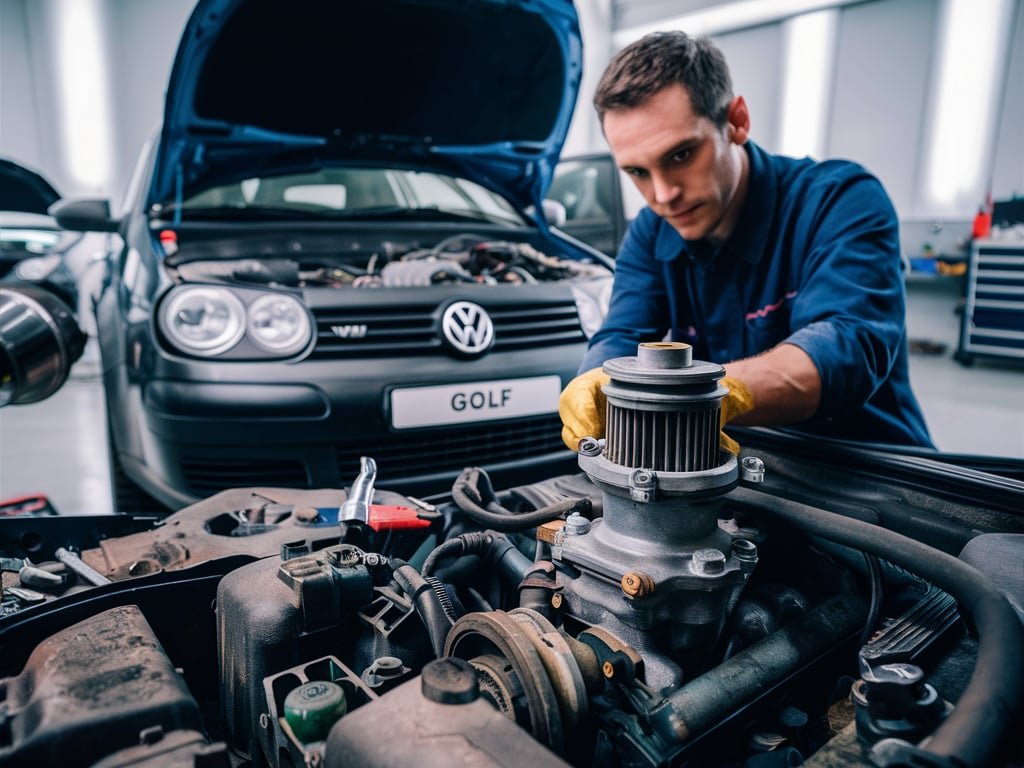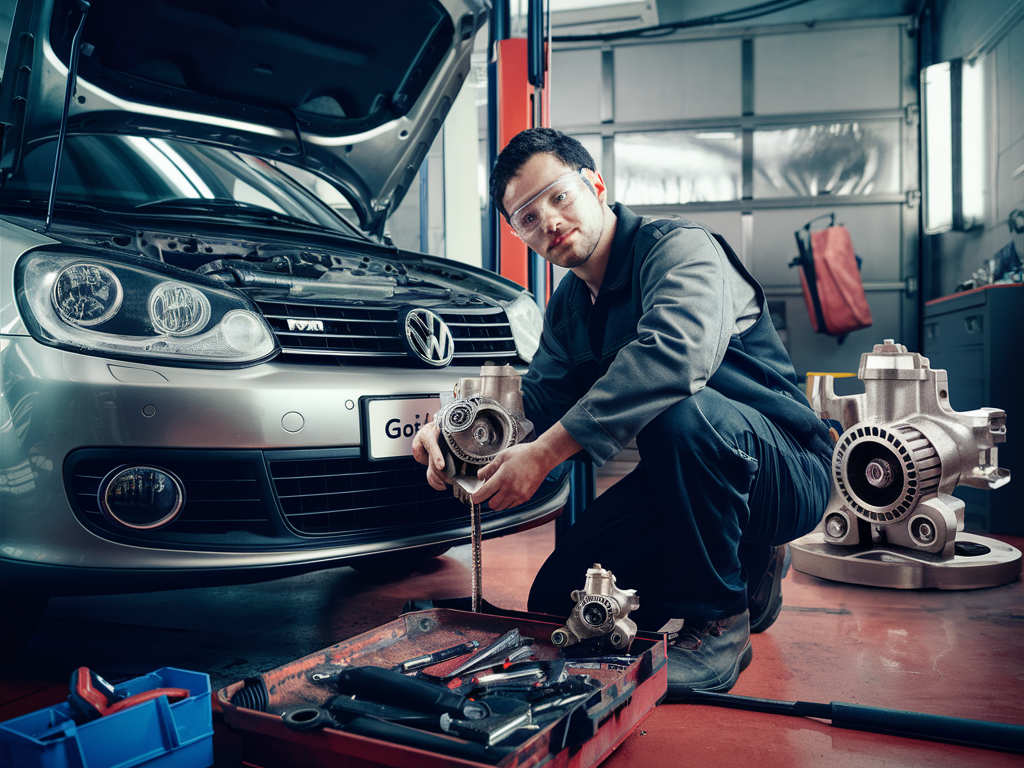Is your Volkswagen Golf overheating or losing coolant faster than usual? That could be a sign of a failing water pump, a critical component in your car’s cooling system. Without it, coolant won’t circulate properly, leading to engine overheating and potential long-term damage. Whether you’re driving through Dubai’s scorching heat or stuck in traffic, a faulty water pump can leave you stranded. Understanding when and why you need a VW Golf water pump replacement can save you from costly repairs down the road. Let’s dive into everything you need to know.

Did you know your VW Golf can have different types of water pumps depending on the model and engine type? Choosing the right one is crucial for maintaining an efficient cooling system and preventing engine overheating. Let’s break down the main types:
Both mechanical and electric water pumps are essential for maintaining your Volkswagen Golf’s cooling system. Choosing the right one depends on your model and engine type. If you’re unsure, a professional inspection can help prevent unexpected failures.
A failing water pump can cause engine overheating, coolant leaks, and poor performance. Understanding the most common issues helps in early detection and timely VW Golf water pump replacement.
Rust, debris, and contaminants in the coolant system can corrode the pump’s internal components, reducing its efficiency and lifespan. Using low-quality or mixed coolants accelerates wear.
Over time, the bearings and seals inside the pump degrade, leading to coolant leaks and reduced cooling efficiency. If left unchecked, this can cause engine overheating.
High temperatures and aging materials can cause cracks or fractures in the pump housing. This leads to coolant loss and system failure, requiring immediate VW Golf water pump replacement.
In mechanical water pumps, the drive belt controls coolant circulation. A worn or broken belt results in reduced coolant flow, leading to engine overheating and possible breakdowns.
Using the wrong coolant or failing to change it at recommended intervals can lead to chemical buildup, corrosion, and reduced cooling efficiency, ultimately damaging the pump.
Incorrect installation or cheap aftermarket parts can lead to misalignment, leaks, or early failure. Always opt for professional installation and high-quality components to ensure long-term performance.
A failing water pump can lead to serious engine damage if not addressed in time. Watch out for these warning signs:
If you notice puddles of coolant under your Volkswagen Golf or visible leakage around the water pump, it’s a clear sign of a failing seal or worn-out housing.
A malfunctioning water pump reduces coolant circulation, causing sudden temperature spikes and potential engine overheating, which can lead to severe damage.
A whining or grinding sound from the engine bay may indicate worn-out bearings inside the water pump, signaling imminent failure.
Frequent drops in coolant levels without visible leaks could mean internal water pump issues or small leaks that worsen over time.
If your car’s heater isn’t warming up properly, it could mean the water pump isn’t circulating coolant effectively, affecting both engine cooling and cabin heating.
The water pump plays a critical role in maintaining engine temperature and preventing overheating. When replacing it, you’ll need to choose between OEM and aftermarket options—each with its pros and cons.
OEM water pumps are designed specifically for Volkswagen Golf models, ensuring a perfect fit and efficient coolant circulation. They meet Volkswagen’s engineering and durability standards, making them a reliable choice. Since they’re built to manufacturer specifications, they also help maintain your vehicle’s warranty.
Aftermarket pumps come in a variety of brands and price ranges, but quality can be inconsistent. Some may perform well, while others might lack proper seals, bearings, or coolant flow control, leading to premature failure.
While aftermarket options exist, using a genuine Volkswagen water pump ensures optimal performance, durability, and reliability. It’s the safest choice to protect your engine and keep your vehicle running smoothly. More importantly, it helps you avoid costly repairs and maintain warranty coverage.
Replacing the VW Golf water pump is a critical maintenance task to ensure proper engine cooling and prevent overheating issues. Here’s a step-by-step breakdown of the process:
A detailed inspection is conducted to confirm water pump failure before proceeding with the replacement.
To prevent contamination, the old coolant is removed before installing the new pump.
The faulty water pump is carefully dismantled to avoid damaging nearby components.
A new OEM or high-quality VW Golf water pump replacement is securely fitted to maintain cooling efficiency.
Fresh VW-approved coolant is added, and air pockets are removed to ensure smooth circulation.
The engine is started, and multiple checks are performed to verify the VW Golf water pump replacement is successful.

The VW Golf water pump doesn’t have a fixed replacement interval, but it’s typically changed every 60,000 to 100,000 kilometers, often alongside the timing belt replacement. Over time, seals wear out, bearings fail, and leaks develop, leading to cooling system inefficiencies. If you notice coolant leaks, overheating, or unusual noises, immediate inspection is necessary. Delaying replacement can cause severe engine damage due to overheating. Regular maintenance, using high-quality coolant, and timely belt inspections help extend the pump’s lifespan and prevent unexpected failures.
The cost of replacing a VW Golf water pump depends on factors like part selection, labor charges, and additional repairs. Choosing between OEM and aftermarket parts affects the overall price, and labor rates vary across garages in Dubai.
Factor | Details | Estimated Cost (AED) |
OEM Water Pump | High-quality, manufacturer-approved | 1,200 – 2,400 |
Aftermarket Water Pump | Varies in quality, more affordable | 800 – 1,500 |
Labor Charges | Depends on garage rates & expertise | 500 – 1,200 |
Additional Repairs | Timing belt, thermostat, coolant flush | 300 – 800 |
Estimated Time | Average service duration | 2 – 4 hours |
Final Thoughts: Opting for an OEM water pump ensures durability and compatibility, while aftermarket options offer budget flexibility. A professional replacement prevents overheating risks and maintains engine efficiency.

Choosing the right Volkswagen service center for water pump replacement ensures your car runs smoothly without the risk of overheating. Our expertise and commitment to quality set us apart.
With our specialized VW expertise, your Volkswagen Golf gets the best care and long-term reliability.
Book a Call Back Now
A faulty water pump can lead to severe engine damage and overheating, making timely VW Golf water pump replacement essential. With certified VW technicians, genuine OEM parts, and advanced diagnostics, we ensure a reliable and efficient service tailored for your Volkswagen Golf.
Don’t wait for a breakdown—book your VW Golf water pump replacement today! Contact us now to schedule an appointment and keep your cooling system running at peak performance.
“Talk to a Volkswagen Expert Now by booking a call, and get personalised solutions for your Volkswagen unique needs and requirements.”
+971564646081
